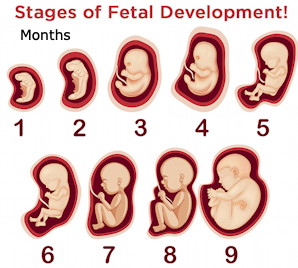last updated 29 June 2022
Supreme Court:
In 1973 The Supreme Court decision Row vs Wade limited state's right to regulate abortion.
In 1992 Planned Parenthood v. Casey the court upheld Roe
In 2022 In Dobbs v. Jackson Women’s Health Organizationa a conservative court overturned Row.
When does life start? Fetal Development
The whole Pro-Life argument depends on when life starts.
There are several arguments as to when Life starts depending on the fetal development process.
Conception to Embryo:
At Early Fetal Development | American Pregnancy Association
They distinguish between Gestational Age and Fetal Age.
You cannot determine exactly when conception occurred. The first sign of pregnancy is often a missed period, which happens around 15 days past ovulation (DPO). Ovulation) typically occurs 15 days after the start of the Menstrual cycle and is when conception can occur. Gestational age is the calculation that most doctors use to calculate due date, and it is based on the first day of your last menstrual period (LMP). It technically includes approximately two weeks where the woman was not pregnant.
The fetal age is another term that refers to the actual age of the baby starting at the time of conception. So typically, fetal age is going to be two weeks less than gestational age.
At conception fertilized egg contains single set of 46 chromosomes called a zygote – the basis for a new human being. The fertilized egg, called a morula, spends a couple of days traveling through the fallopian tube toward the uterus and dividing into cells.
The morula becomes a blastocyst and will eventually end up in the uterus. Anywhere from day 6 – 12 after conception, the blastocyst will embed into the uterine lining and begin the embryonic stage.
Pregnancy Detection:
The first sign of pregnancy is often a missed period, which happens around 15 days past ovulation (DPO). Some women may notice symptoms as early as 5 DPO, although they won’t know for certain that they are pregnant until much later.
There are various other signs of pregnancy such as:
Cramping
Raised basal body temperature
...
As soon as the fertilized egg implants into the uterine wall, a pregnancy hormone called human chorionic gonadotropin (hCG) is produced.
. This means a high-quality pregnancy test could detect a pregnancy in as little as five days after conception.
There are claims that home pregnancy tests are 99% accurate, but it’s important to know the percentage of accuracy is not that high when the test is taken right at the time of a missed period.
According to the American Pregnancy Association, blood tests for hCG levels should be accurate 11 days after conception, while it would be best to wait 12–14 days before taking a urine test.
Early signs of pregnancy can be easy to miss, especially if the person has not been pregnant before.
See 5 DPO: Early symptoms and when to take a pregnancy test
Heartbeat: Gestational Age Week 7 (Fetal Age: 5 weeks)
Some laws limit abortion after heartbeat.
Many have criticized these because many women do not know they are pregnant until after this time.
Fetal Stage - Gestational Age Week 8 & 9 (Fetal Age: 6-7 weeks)
Everything that is present in an adult human is present in the developing embryo and it enters the fetal stage.
If a strong heartbeat is not detected at this point, another ultrasound scan may be done to verify the viability of the fetus.

Viability
In biological terms, viability is the ability to survive successfully. A fetus is considered viable if it has reached a stage of development where it is able to live outside of its mother’s womb.
Doctors typically consider the 24-week mark ( 5½ months)to be the point of potential viability.
Terms:
DPO - days past ovulation
Embryo - the early stage of development from just after fertilization until the fetal stage, Gestational Age Week 8 & 9 (Fetal Age: 6-7 weeks)
Fetal Stage - A prenatal human being in the womb between the embryonic stage and birth. From the ninth week after fertilization to about 38 weeks after fertilization.
hCG - Human Chorionic Gonadotropin - Hormone released on implantation. Measured in pregnancy tests.
LMP - last menstrual period
Progesterone - Progesterone is the hormone that helps maintain the pregnancy until birth.
Ultrasound - An imaging method that uses sound waves to produce images of structures within your body.
Uterus - The hollow, pear-shaped organ in a woman's pelvis. The uterus is where a fetus (unborn baby) develops and grows. Also called womb
See:
Where major religious groups stand on abortion | Pew Research Center
Islam and abortion - Wikipedia
Links:
Abortion
 Health
Health
 Pregnancy
Pregnancy
 Health
Health
 Pregnancy
Pregnancy
